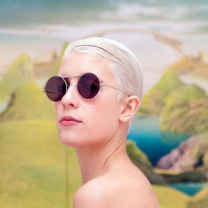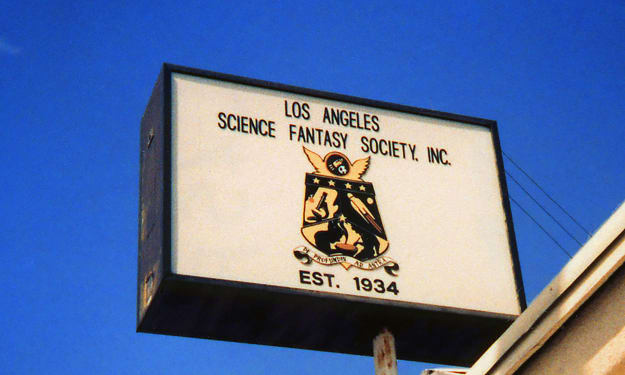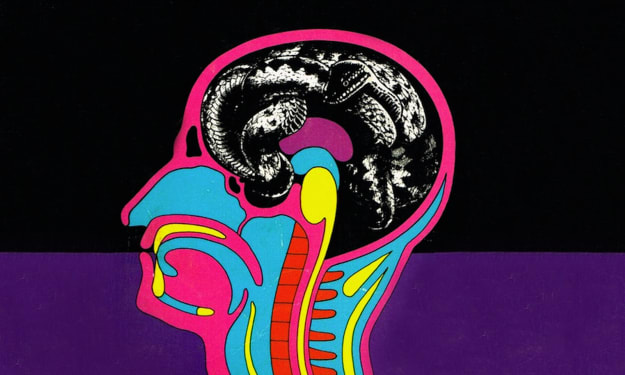Claire Evans
Bio
Claire L. Evans is the lead singer of the pop duo YACHT. She lives in Los Angeles.
Stories (7/0)
Science Journalist Lee Billings On Life Beyond the Solar System
The history of science can be read as a series of brusque reality checks. Once, we imagined ourselves the center of a small and harmonious universe, gifted with a sun content to revolve placidly around the Earth. In time, however, our real estate was relegated from the center of everything to a hum-drum corner of an unimportant galaxy in a much bigger and more tumultuous universe. Upon closer inspection, our sun was revealed to be just another star, born from a nebula, fated for eventual collapse. At the same time, we came to understand the spark of life, transforming in the process from the mini-gods of a pedantic little empire into nothing more than a consequence of biological randomness.
By Claire Evans7 years ago in Futurism
Los Angeles Science Fantasy Society
“Pioneering is never done in front of cheerleaders urging on a roaring grandstand of popular approval.” Star Trek legend George Takei speaks to a generation science fiction pioneers all over the world. Since it's creation, sci-fi fans have bound together as a tight-knit collective, sharing ideas and theories. Organizations like The Los Angeles Science Fantasy Society bring together science fiction's biggest fans to review past and present genre favorites. LASFS is the longest continually running science fiction club in the world. Founded in 1934 as a charter group of the Science Fiction League, it has endured World War II, the LA riots, the shifting tides of fan culture, and the death of its most active member and cheerleader, fandom legend Forest J Ackerman. Forest J Ackerman is an American magazine editor, science fiction writer and literary agent. From its current home base in Van Nuys, California, the LASFS hosts weekly meetings, and keeps an impressive lending library of science fiction materials. One of my favorite Internet spelunking journeys is to go deep, deep into the LASFS' rigorously complete photo archives, which document conventions, readings, and meetings of science fiction fans and legends alike from over a 75-year history. With the blessing of the LASFS, here are some of our favorites.
By Claire Evans8 years ago in Futurism
Seinfeld Episodes Wax Philosophical
Seinfeld, the defining 30-minute sitcom that dominated the entire decade of 1990s entertainment, was the brainchild of Jerry Seinfeld and Larry David. For over a quarter of century, many viewers remain consumed and entertained by this masterpiece of television production. More than just a comedy, the show reflected a new found appreciation for philosophical musings and existentialism. The characters have become pop culture icons immortalized with bobble heads and Funko Vinyl Idol action figure. For some, Jerry Seinfeld was a spiritual guide preaching through observational humor. For others, it was a sociological study of religious stereotypes and codecs. For a small group of existential intellectual highbrows it was an academic study characterizing the philosophical and anthropological identity of the 1990s. This small group of Ivory Tower Mensa Members live in their Upper East Side Manhattan apartments with their German made cars parked below in the garage, looking over the park at what appears to be a different species populating the Upper West Side. These New York west siders are best kept to their 60 square block enclave. When they stray beyond their territory to the Garden State Mall in Paramus, NJ, they enter the Twilight Zone. "The Parking Garage" is perhaps one the of the top Seinfeld episodes ever. Jerry Seinfeld, Elaine Benes, George Costanza, and Cosmo Kramer find themselves in a deep existential dilemma – one of the many.
By Claire Evans8 years ago in Futurism
Ben Bova Interview
"Don't ask your readers to admire your words when you want them to believe your story." Science Fiction author Ben Bova realized that the general rules of science - don't add an experiment to an experiment, and don't make things overly complicated - also applied to science fiction. His theory certainly brought him success. Starting out as a technical writer for Project Vanguard in the 1950's, Ben Bova went on to become a successor to John W. Campbell as editor of editor of Analog Science Fact & Fiction where he won six Hugo Awards. Throughout his career he authored over 120 books on science fact and science fiction, worked as editorial director for OMNI magazine, and was president of both the National Space Society and the Science Fiction Writers of America. He has appeared as the Guest of Honor at the Florida convention Necronomicon on two separate occasions, and in 2000, he attended the 58th World Science Fiction Convention as the Author Guest of Honor.
By Claire Evans8 years ago in Futurism
How Dinosaurs Had Sex
I remember the moment I realized, as an adult, that I didn't know how birds had sex. I was gazing out the window of the library, considering a couple of sparrows on a telephone wire outside. They were sitting side-by-side, gazing outwards, as birds sometimes do, and I found myself wondering about their courtship. First came love, I mused, then...what? What happened between easeful flitting around on telephone wires and the domestic menage of egg-and-nest? I was shocked that I'd never even considered this question before.
By Claire Evans10 years ago in Futurism
Science Fiction Author Frederik Pohl
Pohl’s early career unfolded over the background of the Great Depression and the Second World War, a climate of unimaginable fear and uncertainty. This was the so-called "Golden Age" of science fiction, the years of John W. Campbell's catalytic editorship of Astounding Science Fiction, when pulp publishing was slowly metamorphosing into a defined genre, an era when its practitioners hadn’t yet begun to comment on the gloomy aspects of progress. To Pohl’s generation, science represented the potential for escape from the disaster of economic failure and war. No one was looking for a downside; they only saw the virgin capacities of uncolonized planets, and dreamt of a people united in the betterment of the species through new technology. “In those early days,” Pohl writes in his lovely collection of short stories, The Early Pohl, “we were as innocent as physicists, popes and presidents. We saw only the promise, not the threat.”
By Claire Evans10 years ago in Futurism
I Surgically Implanted Earbuds Under My Skin
The human body doesn't do upgrades. Take poor care of your machinery, and there's no reboot, no system overhaul, no virus software that can come to your aid. In terms of the basic sensory apparatus and what it offers, you're pretty much stuck with the equipment you're born with. At least, until now.
By Claire Evans10 years ago in Futurism








